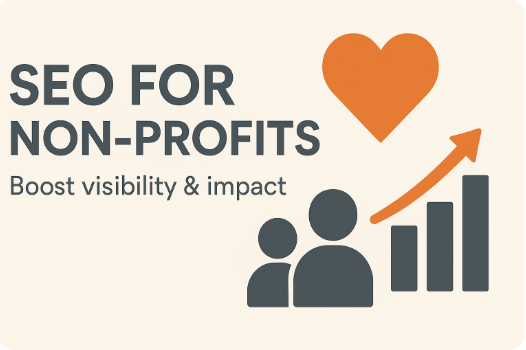In today’s digital-first world, a strong online presence is not just a luxury; it’s a necessity. For non-profit organisations, this necessity translates to opportunities—opportunities to amplify their cause, engage potential donors, and reach those in need of their services. However, achieving this visibility often hinges on one critical factor: search engine optimisation (SEO). Despite its reputation as a technical and resource-intensive endeavor, SEO can be a powerful and cost-effective tool for non-profits when approached strategically. Here, we explore why SEO matters for non-profits and how these organisations can create strategies for success.
Why SEO Matters for Non-Profits
SEO is the art and science of enhancing a website’s visibility in search engine results pages (SERPs). When executed well, it can drive organic traffic, increase engagement, and build credibility. For non-profits, the stakes are uniquely high:
- Raising Awareness: Many people turn to search engines to find information about causes they care about. Ranking highly for relevant terms ensures your organisation’s message reaches the right audience.
- Attracting Donations: Online giving is growing, with an increasing number of donors searching for non-profits that align with their values. A strong SEO strategy can help your organisation stand out and foster trust.
- Engaging Volunteers: Volunteers are the backbone of many non-profits, and effective SEO ensures potential helpers can easily find you when searching for ways to get involved.
- Reaching Beneficiaries: For organisations providing services to specific communities, being visible online means directly impacting those who need help the most.
Despite the benefits, non-profits often operate with limited budgets and small teams, making it essential to prioritise strategies that offer the highest return on investment.
Strategies for Success
1. Start with Keyword Research
Keyword research is foundational to any SEO strategy. Non-profits should identify the words and phrases their target audience is searching for. Tools like Google Keyword Planner, Ubersuggest, or AnswerThePublic can provide valuable insights.
- Branded Keywords: Ensure your organisation’s name ranks prominently in search results.
- Cause-Specific Keywords: Focus on terms related to your mission, such as “climate change solutions” or “animal rescue near me.”
- Action-Oriented Keywords: Include phrases like “how to volunteer for [cause]” or “donate to [cause].”
Once you have a list, prioritise keywords based on search volume, relevance, and competition.
2. Optimise Your Website’s Structure and Content
Search engines reward well-organised and user-friendly websites. Here’s how non-profits can optimise their sites:
- Clear Navigation: Ensure your website is easy to navigate, with intuitive menus and internal links to key pages.
- Mobile Optimisation: Many users access websites on mobile devices, so responsive design is critical.
- Content Optimisation: Use your target keywords naturally within headings, subheadings, and body text. Create informative and engaging content that addresses your audience’s needs.
3. Create High-Quality Content
Content is the backbone of SEO. By publishing relevant, high-quality material, non-profits can position themselves as thought leaders in their domain. Consider the following formats:
- Blog Posts: Share stories of impact, explain your mission, and discuss industry trends.
- FAQs: Answer common questions about your cause or organisation.
- Case Studies: Highlight success stories to demonstrate your organisation’s effectiveness.
- Videos and Infographics: These formats are highly shareable and can boost engagement.
4. Leverage Local SEO
For non-profits with a local focus, optimising for local searches is crucial. This includes:
- Google Business Profile: Claim and optimise your profile with accurate contact information, photos, and updates.
- Local Keywords: Incorporate location-specific terms like “food bank in [city]” or “recycling initiative [state].”
- Local Backlinks: Collaborate with local organisations and media to earn backlinks.
5. Build a Robust Backlink Profile
Backlinks—links to your website from other sites—are a key ranking factor for search engines. For non-profits, this can be achieved by:
- Partnerships: Collaborate with businesses, educational institutions, or other non-profits to share links.
- Press Coverage: Secure media coverage about your events or achievements, which often includes backlinks.
- Guest Blogging: Write articles for other websites in exchange for a link back to your own.
6. Use Technical SEO Best Practices
Technical SEO involves optimising your website’s infrastructure to ensure it can be effectively crawled and indexed by search engines:
- Fast Load Times: Compress images and use caching to improve site speed.
- XML Sitemap: Submit a sitemap to search engines to help them understand your site’s structure.
- HTTPS: Secure your site with an SSL certificate to boost rankings and build trust.
7. Engage on Social Media
While social media signals don’t directly influence SEO rankings, an active presence can amplify your content’s reach and drive traffic. Non-profits should:
- Share blog posts, updates, and events.
- Encourage followers to share content.
- Collaborate with influencers or advocates in your niche.
8. Monitor and Adjust
SEO is an ongoing process, not a one-time task. Regularly monitor your performance using tools like Google Analytics, Google Search Console, and third-party SEO platforms. Pay attention to metrics like:
- Organic traffic
- Keyword rankings
- Bounce rate
- Conversion rate
Use this data to refine your strategy and focus on what’s working.
Overcoming Common Challenges
Non-profits often face unique challenges when implementing SEO strategies:
- Limited Resources: With small budgets and teams, prioritisation is key. Focus on high-impact strategies like content creation and local SEO.
- Lack of Expertise: SEO can be intimidating for those unfamiliar with it. Investing in training or consulting with experts can make a significant difference.
- Keeping Up with Trends: SEO is ever-evolving. Following reputable SEO blogs and attending webinars can help non-profits stay informed.
In closing:
SEO is an invaluable tool for non-profits seeking to amplify their impact. By strategically investing time and effort into keyword research, website optimisation, and content creation, even organisations with limited resources can achieve meaningful results. In the end, the goal of SEO for non-profits isn’t just about ranking higher in search results; it’s about connecting with people—donors, volunteers, and beneficiaries—who share your passion for making the world a better place. With a thoughtful approach, non-profits can ensure their mission resonates far and wide, empowering them to create lasting change.
Frequently Asked Questions (FAQ):
Q: What is SEO for non-profit organisations?
A: SEO helps your charity or NFP appear higher in Google so people can find your services, donate, volunteer, or refer clients. It covers technical fixes, on-page optimisation, content, links, and local visibility.
Q: How is SEO for charities different to for-profit SEO?
A: Non-profits often have tighter budgets and different goals (donations, volunteers, referrals, service access). Trust, accessibility, impact stories, and clear calls to action matter more, and success isn’t just sales—it’s sign-ups and service outcomes.
Q: Where should an NFP start with limited budget and time?
A: Start with quick wins:
- Claim/optimise your Google Business Profile.
- Fix page titles, meta descriptions, headings, and internal links.
- Improve mobile speed and accessibility.
- Set up GA4 and Google Search Console.
- Create a simple content plan answering common questions.
- Build citations and local links via councils, partners and directories.
- Add basic schema (Organisation, FAQ) where relevant.
Q: Which keywords should a non-profit target?
A: Focus on:
- Service + location terms (e.g. “family counselling Perth”).
- Cause/need-based questions (“how to donate furniture Brisbane”).
- Volunteer and donation intent queries.
- Branded and program names. Use Search Console, autocomplete and People Also Ask to find real queries, and avoid jargon.
Q: What content works best for charities and NFPs?
A: High-impact content includes service pages with eligibility and locations, FAQs, how-to guides and checklists, impact stories with proof, volunteering info, donation pages with trust signals, events/program pages, and annual reports or outcomes summaries.
Q: How can a charity improve local search visibility?
A: Keep NAP details consistent, build relevant local citations, create location pages with clear service areas, earn local backlinks (councils, community groups, media), collect and respond to reviews, and keep your Google Business Profile updated with posts and events.
Q: Can a small team or volunteers manage SEO in-house?
A: Yes—use simple checklists, an editorial calendar, and basic tools (Search Console, PageSpeed Insights, Screaming Frog free, keyword tools). Provide light training, maintain access controls, and run quarterly mini-audits to stay on track.
Q: How long does SEO take for a non-profit website?
A: Expect initial movement in 1–3 months if the site is healthy and content is added, with stronger gains over 3–6 months. Competitive topics and new sites may take 6–12 months. Quick wins (titles, internal links, GBP) can help within weeks.
Q: How do we measure SEO success for an NFP?
A: Track organic traffic, impressions and rankings, plus outcomes that matter: donations, volunteer sign-ups, enquiries, referrals and bookings. Use GA4 events/conversions and Search Console, and report monthly with simple dashboards.
Q: How does SEO relate to Google Ad Grants?
A: Ad Grants is paid search, not organic, so it doesn’t directly affect rankings. But SEO-optimised landing pages can improve ad relevance and engagement. Together, Grants drive immediate traffic while SEO builds sustainable visibility.



